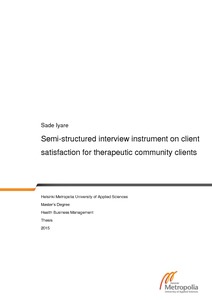Semi-structured interview instrument on client satisfaction for therapeutic community clients
Iyare, Sade (2015)
Iyare, Sade
Metropolia Ammattikorkeakoulu
2015
All rights reserved
Julkaisun pysyvä osoite on
https://urn.fi/URN:NBN:fi:amk-201505117202
https://urn.fi/URN:NBN:fi:amk-201505117202
Tiivistelmä
Therapeutic community (TC) treatment is used around the world to treat drug addicts. Perheiden yhdistetyn hoidon yksikkö (Pyy) unit of Helsinki Deaconess Institute is specialized in drug rehabilitation of the families with children.
Based on Cox's Interactive Model of Client Health Behavior (2003) there is a connection between the client satisfaction and the results of the treatment. TC is known to be efficient method of treatment to treat drug addicts, but there is still very little data collected from client satisfaction in TC care. The aim of this study was to develop a semi structured interview instrument on client satisfaction in TC care in Pyy and conduct a pilot study using the instrument.
The instrument was developed with Delphi technique, where panel of TC experts commented on the suggested themes of the instrument during two Delphi rounds, ending with the total number of 13 open-ended questions. The pilot interviews were conducted by Pyy staff.
There are four main themes in the developed instrument: affective support towards the client, useful health information, client's decisional control over their care and professional-technical competencies of the care provider. The pilot interviews show that this kind of interview instrument can work also in TC setting, and it can bring important information from the client perspective to the personnel on how to develop the TC treatment method in Pyy unit. Since the instrument questions developed are not specific to Pyy care, the instrument could be applied also in other TC settings.
Based on Cox's Interactive Model of Client Health Behavior (2003) there is a connection between the client satisfaction and the results of the treatment. TC is known to be efficient method of treatment to treat drug addicts, but there is still very little data collected from client satisfaction in TC care. The aim of this study was to develop a semi structured interview instrument on client satisfaction in TC care in Pyy and conduct a pilot study using the instrument.
The instrument was developed with Delphi technique, where panel of TC experts commented on the suggested themes of the instrument during two Delphi rounds, ending with the total number of 13 open-ended questions. The pilot interviews were conducted by Pyy staff.
There are four main themes in the developed instrument: affective support towards the client, useful health information, client's decisional control over their care and professional-technical competencies of the care provider. The pilot interviews show that this kind of interview instrument can work also in TC setting, and it can bring important information from the client perspective to the personnel on how to develop the TC treatment method in Pyy unit. Since the instrument questions developed are not specific to Pyy care, the instrument could be applied also in other TC settings.
